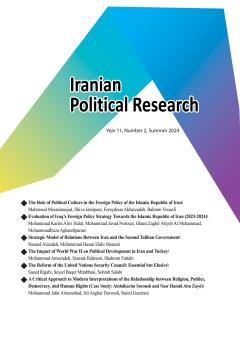The Yemen Crisis from the Perspective of the International Community with Reference to the United Nations Charter
Subject Areas : Iranian Political Research
Elham Karimi
1
*
![]() ,
Sohrab Salehi
2
,
Abomohamad Asgarkhani
3
,
Sohrab Salehi
2
,
Abomohamad Asgarkhani
3
1 - PhD. Student, Department of Law and Political Science, Qeshm Branch, Islamic Azad University, Qeshm, Iran
2 - Assistant Professor, Department of Criminal Law and Criminology, Imam Hussein (AS) University, Tehran, Iran
3 - Associate Professor, Department of Law, University of Tehran, Tehran, Iran
Keywords: Yemen, United Nations Charter, International Obligations, War, Human Rights, International Law.,
Abstract :
The aim of this study is to examine the Yemen crisis from the perspective of the international community with a focus on the United Nations Charter. The research method is descriptive-analytical, and the results indicate that, regardless of the objectives of Saudi Arabia and its allied states in attacking Yemen, and independent of whether the aggression against Yemen was legal under the rule prohibiting the use of force in international relations—which is the cornerstone of the formation of the United Nations—and irrespective of whether the Yemen conflict is classified as international, all parties involved in the Yemen war are bound by the treaties to which they are signatories. Based on this framework, and relying on extensive and legally admissible evidence, it can be concluded that the forces attacking Yemen have repeatedly committed three international crimes: "war crimes", "crimes against humanity", and "genocide." The perpetrators of these crimes must be pursued, tried, and punished according to existing treaties by competent judicial authorities. Furthermore, Yemen’s courts and the courts of the signatory states of the four Geneva Conventions (1949) are considered the most appropriate judicial bodies, given their universal jurisdiction.
انوزلا، علی (1397). مغرب و عقبنشینی از جنگ یمن. خبرگزاری بینالمللی تصویری ایران پرس. قابل دسترس در:
https://farsi.iranpress.com
چایساری، کیتی؛ ساک، کریانگ (1382). حقوق کیفری بینالمللی. ترجمه حسین آقایی جنتمکان. تهران: دانشور.
حامد، سهیلا (1385). صلاحیت جهانی. تهران: جهاد دانشگاهی.
حبیبی، همایون (1383). بررسی محکمه صدام از دیدگاه حقوق بینالملل. پژوهش حقوق و سیاست، شماره10، ص120-97.
خالقی، علی (1390). جُستارهایی از حقوق جزای بینالملل. تهران: مؤسسه مطالعات و پژوهشهای حقوقی شهر دانش، چاپ دوم.
خلف رضایی، حسین (1389). مصونیت دولت در مواجهه با قواعد آمره. پایاننامه کارشناسی ارشد. تهران: دانشگاه شهید بهشتی.
دیوان بینالمللی دادگستری، 1985م.
زمانی، سید قاسم (1391). حقوق بشر در مخاصمات مسلحانه. موسسه پژوهشهای حقوقی شهر دانش.
صادقی، حسین؛ احمدیان، حسن (1389). دگرگونی جایگاه منطقهای یمن؛ امکانات و چالشها. راهبرد، شمارۀ 56.
صلاحی، سهراب (1395). حقوق بینالملل کیفری. تهران: انتشارات میزان.
فروغی، فضلالله (1388). منشاء و ماهیت حقوقی اصل صلاحیت جهانی. مطالعات حقوقی، 1(3)، ص49-21.
فضائلی، مصطفی (1395). مداخلۀ نظامی در یمن از منظر حقوق بینالملل. مطالعات حقوق عمومی، 46(1).
کاظمی، احمد (1398). جنایات بینالمللی، عربستان سعودی در یمن و چگونگی نقشآفرینی دیوان بینالمللی کیفری (با تأکید بر رسالت رسانههای برونمرزی). پژوهشنامه رسانه بینالملل، 4(4).
ممتاز، جمشید؛ رنجبریان، امیرحسین (1387). حقوق بینالملل بشردوستانه مخاصمات مسلحانه داخلی. تهران: میزان، چاپ سوم.
منتظران، جاوید (1397). جنایات عربستان و پیگرد آن در دیوان بینالمللی کیفری. شبکه مطالعات سیاستگذاری عمومی.
Adra, N. (2013). Women and Peace Building in Yemen; Challenges and Opportunitie. Available at: www. peacebuilding. no/ var/ ezflow_site/storage/ original/a
Andreopoulos, J.G. (1994). Genocide: Conceptual and Historical Dimensions. Philadelphia: University of Pennsylvania Press.
Bassiouni, M.C. (1999). Crimes Against Humanity in International law. Dordrecht, London & Boston: Kluwer law International 2 ed.
Best, G. (1994). The Permanent Revolution: The French Revolution and its Legacy, 1789-1989. University of Chicago Press, Chicago.
Dormann, K., Doswald-Beck, L. & Kolb, R. (2009). Element of war crimes under the Rome statute of the international criminal cour: sources and commentary. Cambridge university Press.
GIULIO COPPI (2018). The Humanitarian Crisis in Yemen: Beyond the Man-Made Disaster. IPI Publications. URL= https://www.ipinst.org/wp-content/uploads/2018/01/IPI-Rpt-Humanitarian-Crisis-in-Yemen.pdf
Goldman, R. & Tittemore, B.D. (2002). Unprivileged Combatants and the Hostilities in Afghanistan: Their Status and Rights Under International Humanitarian and Human Rights Law. The American Society of International Law, ASIL Task Force Papers.
Graham, L. (2020). Prosecuting Starvation Crimes in Yemen's Civil War, 52 Case W. Res. J. Int'l L. 267. Available at: https://scholarlycommons.law.case.edu/jil/vol52/iss1/14. P.278
Hegl, G.W. (1998). Principes de la philosophie du droit. Quadrige.
Isa, B. (2011). Chaos in Yemon: Societal Collapse and the New Authoritarianism. Routledge.
Keeke, O.R. (2009). The Grave breaches Regime and Universal Jurisdiction. Journal of International Criminal Justice. no.7, p. 743-761.
Matheson, M.J. (2006). Council Unbound: The Growth of UN Decision Making on Conflict and Postconflict Issues after the Cold War. Washington, D.C.: U.S. Institute of Peace.
Miliband, D. (2018). On the Crisis in Yemen.
Qureshi, W.A. (2020). The Crisis in Yemen: Armed Conflict and International Law, 45 N.C. J. INT'L L. & COM. REG. 227. Available at: https://scholarship.law.unc.edu/ncilj/vol45/iss1/5
Untangling the Yemen Crisis. American University Washington College of Law, 2020. URL= https://digitalcommons.wcl.american.edu/cgi/viewcontent.cgi?article=2823&context=facsch_lawrev

